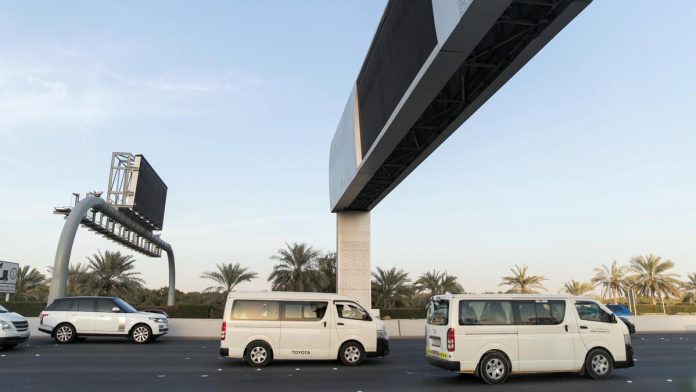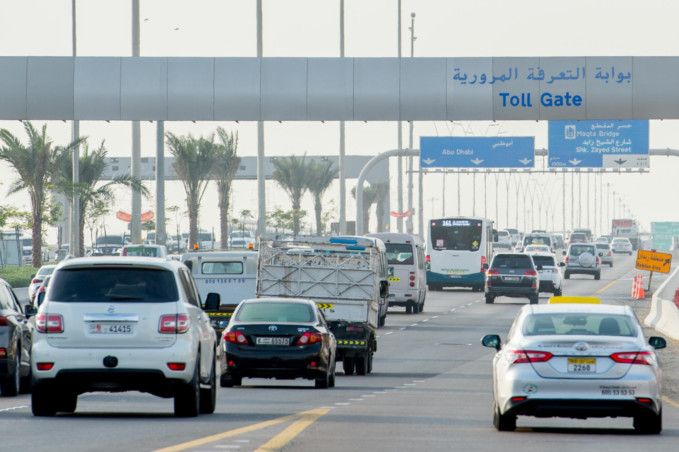
Abu Dhabi Traffic System (Abu Dhabi): Starting January 1, new radars across Abu Dhabi emirate will notify drivers if they fail to buckle up in the car. Notifications will also be sent by SMS if a driver is found using a hand-held device.
These are part of a slew of changes that have begun to be implemented over Abu Dhabi’s transport network during the last few weeks.
In fact, the most notable among these traffic system changes will come into effect on January 2. The Darb road tolls will charge motorists for crossing between Abu Dhabi island and the mainland during weekday peak hours. The introduction of the road tolls follows a year in which major changes to the traffic network were put on hold by the Abu Dhabi Government as a means of relief for residents burdened by COVID-19 challenges.
Now, at the start of 2021, the Abu Dhabi Police will ensure that automated traffic violation notifications are sent to motorists. The system has been developed in coordination with the Abu Dhabi Digital Authority, and aims to make Abu Dhabi’s roads safer with the elimination of some hazardous driving behaviours.

Darb registration
The emirate’s public transport regulator — the Department of Municipalities and Transport’s Integrated Transport Centre — is in charge of the Darb toll system. It announced in December 2020 that residents had been signing up in droves on the online payment system, with more than 200,000 users registered so far. Residents said that the registration process, both on the dedicated Darb website and on the smartphone app, has been straightforward and easy, and that they hope to plan their trips around the tolls.
According to ITC officials, the toll system is expected to reduce congestion in the capital city. To ensure this, the toll gates are located at the four bridges that connect Abu Dhabi island to the mainland — Al Maqtaa Bridge, Musaffah Bridge, Sheikh Zayed Bridge and Sheikh Khalifa Bridge. Motorists passing under the gates between 7am and 9am, and between 5pm and 7pm, on any day other than Friday or a public holiday, will have to pay Dh4 per pass, with a maximum daily toll of Dh16 per vehicle.
Also Read: More than 545,000 passengers expected at Dubai Airport between Jan. 1 to 7
Park and Ride launch
Coinciding with the launch of the Darb tolls, the ITC will also introduce a shuttle service tomorrow (January 2). The Park and Ride service will allow motorists to park their vehicles in one of two designated lots — one in Mohammed Bin Zayed City and another in Shahama — and then take free public buses into downtown Abu Dhabi. The service is designed to help commuters avoid both the road tolls, and downtown Abu Dhabi’s parking fees. Motorists who opt for the service can use the designated Park and Ride buses free of charge throughout the day to get around the city, and they will receive two additional tickets for passengers.
COVID-19 border testing
Ahead of the launch of the road tolls, authorities also streamlined the COVID-19 DPI testing facilities at the Abu Dhabi-Dubai border. From a single tent stationed at Ghantoot, the facility was transformed into 18 drive-through DPI testing stations on Al Faya Road in Seih Sheib area. The stations offer the Dh50-per-person DPI tests around the clock, and are located on both sides of the road.
Intercity buses
In addition, the ITC resumed intercity bus services in Abu Dhabi emirate yesterday (December 31). Following a modified schedule, six services are available, including X90 between Abu Dhabi and Al Ain, and X60, X62, X86, X87 and X88 between Al Dhafra Region and the capital. At least two trips per day will initially be available in each direction.
“This is part of the first phase of gradually resuming all public bus services back to their normal schedules, as before the COVID-19 pandemic. Public demand will be monitored in order to increase public bus services in future, while ensure compliance with COVID-19 preventive measures to ensure the safety of public transport users,” the ITC said.
Safe transport options
The updates to the traffic system are designed to make public transport more attractive to road users, thereby reducing congestion in the capital city. They also aim to make the roads safer by reducing violations.
In addition, the ITC has reduced the maximum capacity of each bus by half to ensure protection from COVID-19 risks, while also sterilising each public bus after every trip.



